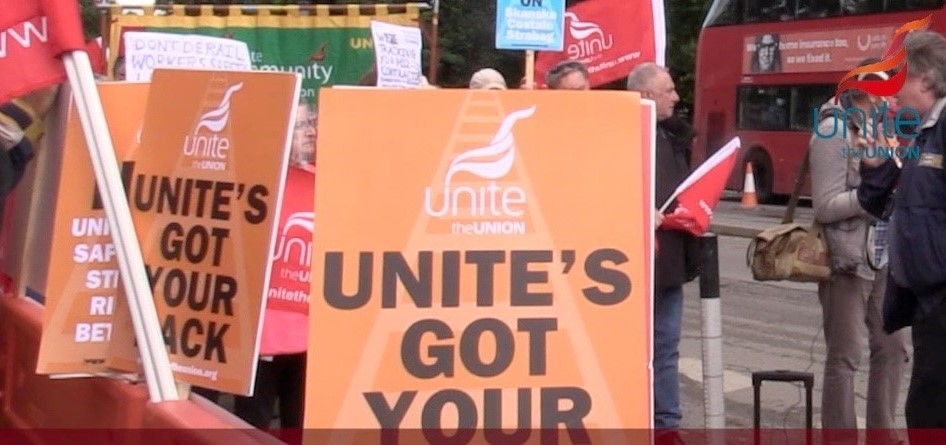Blacklisting: justice fight goes on
While trade unionists spent years being monitored by construction firms in a shocking blacklisting scandal uncovered seven years ago, with many workers not being able to find work for decades, it is now firms’ turn to be watched.
The Information Commissioner’s Office (ICO) committed last week to further investigation of blacklisting that may still be ongoing even after this year’s dramatic High Court case between construction trade unions, representing blacklisted construction workers, and some of the biggest construction firms in the country.
Unite won for its blacklisted members more than £10m in compensation, but Unite has always maintained that the road to justice continues – there’s considerable evidence pointing to persistent blacklisting practices.
More evidence
The ICO agreed this week, noting in a letter to Unite assistant general secretary Gail Cartmail – who gave evidence of contemporary blacklisting to the Scottish Affairs Committee and was interviewed by the Commission in 2013 – that it would call for further evidence next year.
Commenting on the ICO’s decision, Cartmail told UNITElive, “I am proud that Unite played a pivotal role in convincing the Information Commissioner Officer to open the investigation in 2013.
“Unite’s campaign against contemporary blacklisting and evidence to the Scottish Affairs Committee has convinced the ICO to call for further evidence in 2017,” she noted.
“The elephant in the room is proof of secretive vetting workers and weeding out trade union members,” Cartmail added. “It is telling that the ICO pinpoint this and admit, â€Whilst we are not able to demonstrate that such evidence exists, it is not to say that the practice of blacklisting has not, or does not take place’.”
The ICO argued that they were unable to confirm beyond doubt allegations of blacklisting in the Crossrail project, despite compelling evidence, which was in the end circumstantial.
In other words, the ICO said it was just as plausible that workers on the Crossrail project who suspected they had been blacklisted may actually have been redeployed, removed or prevented from working for entirely different reasons.
But Cartmail has highlighted that there is yet more convincing evidence that a blacklist still exists in the construction industry.
“I know that patterns evident among our members is beyond plausible ‘coincidence’, especially where major contractors appear to pull the strings of labour suppliers,” she said. “In our possession is what I believe is a ‘smoking gun’ that will be shared with the ICO as a matter of urgency.”
UK information commissioner Elizabeth Denham expressed deep concern about the possibility of contemporary blacklisting.
“That practice was deeply concerning to me, and we do have some follow-up plans and that’s all I can say right now: we are following up,” she told the Guardian. “I think the practice is something we have to be alert to checking, to make sure that it has ceased.”
Public inquiry
The original blacklist, the subject of this year’s High Court case and which was first discovered in 2009, is thought to have been operating for the last 30 years and contained the names of more than 3,000 workers, who had been monitored by a firm called the Consulting Association.
The information the company gathered on individual workers, which mostly related to their trade union activity or being vocal over health and safety, was then sold to dozens of construction companies.
After being identified in the blacklist as â€troublemakers’ – files in the case showed individuals being labelled with phrases such as “will cause trouble, strong TU [trade union]” and “ex-shop steward, definite problems” – many were unable to find work in construction for decades. Some blacklisted workers were even forced to move abroad.
Following the court case in which trade unions including Unite, Ucatt, and the GMB secured for their blacklisted members more than ÂŁ75m in total compensation, the unions along with the Blacklist Support Group have since continued to lobby the government for stronger laws and a full public inquiry to ensure blacklisting is stamped out once and for all.
This call was echoed by shadow business secretary Clive Lewis last week.
“Blacklisting in construction was an appalling scandal and the victims have never had full justice,” he said. “That’s why we called for a full inquiry that could also consider whether the law itself needs to be changed.
“Ministers can’t just leave this to the information commissioner and it’s well past time they stepped in and took proper action, to ensure all those involved are accountable and this never happens again.”
Cartmail had also made the case for a full public inquiry into blacklisting practices at the TUC conference in September.
“Unite, along with sister unions and the Blacklist Support Group have campaigned for better and tougher laws on blacklisting, winning the support of politicians in Westminster, Holyrood, the Welsh Assembly and councils the length and breadth of the UK,” she told conference.
“This year finally conspirators were dragged to the High Court of Justice and hundreds of trade union members won financial compensation,” she added. “The contractors say they are sorry but to this day they still shy away from the term â€blacklisting’ and still the law intended to protect workers is too weak and woefully inadequate.
“We demand better law and a full public inquiry into blacklisting.”
Do you have reason to believe you may be the victim of contemporary blacklisting? Read Unite’s guidance here.
 Like
Like Follow
Follow

